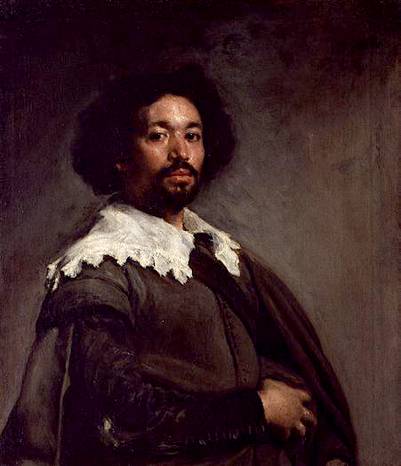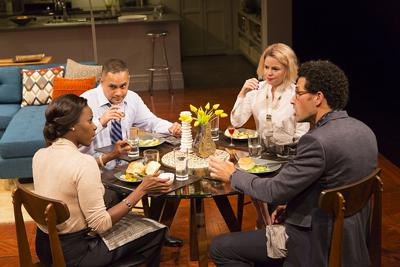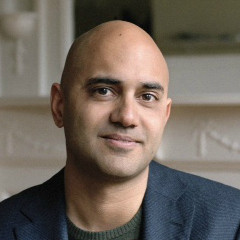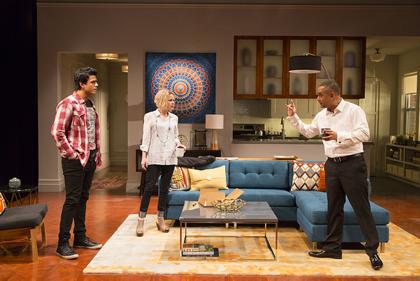Play (2012)
by Ayad Akhtar
Directed by Gordon Edelstein
Huntington Theatre Company
Boston University Theater
Symphony Hall area
Boston
January 8 – February 7, 2016
With Rajesh Bose (Amir), Nicole Lowrance (Emily), Mohit Gautam (Abe), Benim Foster (Isaac), Shirine Babb (Jory)

“Portrait of Juan de Pareja”
Metropolitan Museum of Art
It turns out that Amir Kapoor (Rajesh Bose), who has the appearance of someone from someplace in South Asia, has changed his last name from Abdullah to Kapoor, and somewhat misrepresented his birthplace, not quite owning up to the fact that he’s not exactly what he portrays himself to be. It seems it’s been better for his career in a dominantly Jewish New York corporate law firm to generate expectations he’s Indian and Hindu, rather than what he is, Pakistani and Muslim.
He’s recently been hoping for a partnership in the firm for which he has worked tremendously hard. His wife, Emily (Nicole Lowrance), meanwhile, is an artist who is fascinated by Muslim themes and has, among other things, painted a portrait of Amir inspired by Velasquez’ Portrait of Juan de Pareja (c. 1650) which depicts a slave of Moorish descent who was an assistant in the artist’s workshop. She hopes to get the work exhibited in a gallery owned by Isaac (Benim Foster). He, curiously, is the Jewish husband of the African-American woman law colleague of Amir’s, Jory (Shirine Babb).
Meanwhile, Amir’s nephew, Abe (Mohit Gautam), originally named Hussein, asks Amir to help defend the cleric at his mosque who has been brought up on terrorism charges.
There is more than meets the eye in some of these relationships and once things begin to emerge, sparks fly.

Rajesh Bose as Amir
Nicole Lowrance as Emily
Benim Foster as Isaac
in “Disgraced”
Photo: T. Charles Erickson
Courtesy of Huntington Theatre Company
This curious play, obviously touching from a variety of angles on a lot of sensitive issues, takes as its focus the anguished status of its Muslim protagonist, Amir. He rails against the Koran, identifying it as the source of a lot of prejudicial behavior, including the mistreatment of women. Against Muslim tradition, Amir, who very much identifies as a modern urban type in New York, drinks and eats pork. Clearly he’s not a devout Muslim, but when confronted with questions from his wife and friends about his feelings about the attacks of 9/11, his answer draws surprise. While trying to be enlightened, he also expresses a strong sense of identity with his cultural roots and when that becomes evident it generates a considerable response from the others in his midst. Ultimately, it is his unresolved anguish as a Muslim that he must confront and which becomes the cause of ensuing interactions with his Caucasian wife, his African-American female colleague, and her Jewish husband.

Photo: Courtesy of Huntington Theatre Company
Playwright Ayad Akhtar has certainly set things up to produce a lot of conflict. By putting together in close relationship and at such close range the varied array of cultural types he does here provides the raw materials for conflagration. Explosive interactions logically follow from this collection of types when agitated just enough. When relevant ideological chatter leads to personal interactions that begin to boil, emotions overflow in a variety of ways that emerge from each cultural angle.

Nicole Lowrance as Emily
Rajesh Bose as Amir
in “Disgraced”
Photo: T. Charles Erickson
Courtesy of Huntington Theatre Company
The outcome is at points interesting but also so manufactured out of its intentionally combustible elements that one feels a certain mechanical quality in its narrative. As result, the consequences of the manufactured conflicts don’t feel like a discovery based on the unfolding of character but a series of explosions that characterizes the chemistry of typed human elements. The play’s eventual pyrotechnics keep one alert, but they too, like much of the play’s narrative presumptions, feel like carefully wrought displays of flashing light rather than evocative and exploratory movements of people in trying circumstances.
The current production offers some good performances, and the play, despite its narrative weaknesses, makes an interesting case for how the sense of shame incurred by a complex of cultural impositions helps to germinate the seeds of Muslim rage.
Curiously, the play won the Pulitzer Prize in 2013.
– BADMan
Leave a Reply